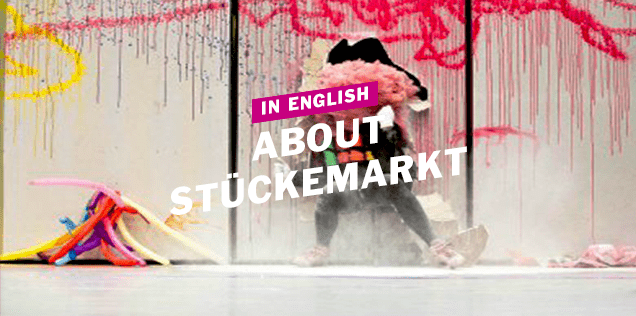As part of the Berliner Festspiele’s annual Theatertreffen festival, the Stückemarkt invites three unconventional theatre makers to examine broader forms of authorship and creative processes.
While Theatertreffen’s main programme focuses on theatre from the German-speaking world, the Stückemarkt showcases new theatre authors from across Europe. This year’s selections go beyond playwright to work outside clearly defined theatre categories, Mona el Gammal, Chris Thorpe and Miet Warlop were chosen by acclaimed theatremakers Katie Mitchell, Signa Köstler and Simon Stephens to present their work.
Creating unique “narrative spaces”, Mona el Gammal (Germany) won the Cologne Theatre Prize for „Haus//Nummer/Null“. She works with renowned performance groups such as La Fura dels Baus and Signa.
Author and performer Chris Thorpe (UK) has collaborated with Unlimited Theatre, Third Angel and the BBC; now, together with director Sam Pritchard, he presents „There Has Possibly Been An Incident“, which premiered at the Latitude Festival in July of last year.
Miet Warlop (Belgium) received the Young Theatre Award for her graduation work at the Royal Academy of Fine Arts in Gent; since then she has developed works for the Campo festival and the Kunstenfestivaldesarts. She comes to Theatertreffen with her 2012 piece „Mystery Magnet“.
Working beyond disciplines
When it comes to financing a new project, strict categories still prevail. However, they no longer apply to mixed artistic forms. Coming from the visual arts, Warlop started doing theatre as she felt the need to bring her tableaux vivants to life: “At some point I decided that my moments and things, my objects and costumes need action because they have to transform”, she explains. Thorpe writes and performs at the same time.
And El Gammal’s work, somewhere between scenography, theatre and visual arts, doesn’t really fit any existing notion: in fact, her Professor Penelope Wehrli invented the term “narrative space” as an assignment. “I was immediately extremely enthusiastic,” El Gammal recalls.
Her spaces literally tell a story, with the help of numerous visual details, texts and sounds: “It’s a bit like being in a book, but in a room, and it’s not linear: the spectator has many different options to explore the story by exploring the space.” She has never met anyone else doing explicitly narrative spaces, but says, “The world is big, there might be other people doing that. I’d be glad to visit one.”
Individuals vs. collectives
Although developed collectively, the selected projects did begin individually. The starting point for „Haus//Nummer/Null“ was El Gammal’s wish to create a futuristic dystopia – a world that she imagined first with her co-author Juri Padel, then with various sound, light, video, graphic and internet designers. “In that sense it’s really a collective process. But I have the artistic responsibility on the whole thing.” Warlop didn’t really develop her piece with her performers but imagined it herself, from set to costumes to character interactions, long before rehearsal began. „A lot happens before the editing process. I only work for half days with the performers, the rest of the day we are working on costumes, objects and actions. I do kind of a shopping out of everything we tried out.“
The collective part of the work takes place onstage: „I’m always performing in my pieces. I think it’s very important that I know my work from the inside, and I also believe in the energy of the group.. It’s part of the work. Together we run the stage.“
Thorpe re-centres the very idea of authorship, based on his playwright experience: “Authorship for me is responsibility for a part of the process of having a conversation in a room. However,” he adds, “it’s hard to separate the concept of authorship with ego, with the wish to be recognised. It would certainly be interesting if all plays, just for a year, were anonymous.”
Photo: Reinout Hiel
Die Berliner Zeitung ist Partner des Theatertreffen-Blogs.
Exberliner is partner of the Theatertreffen-blog
